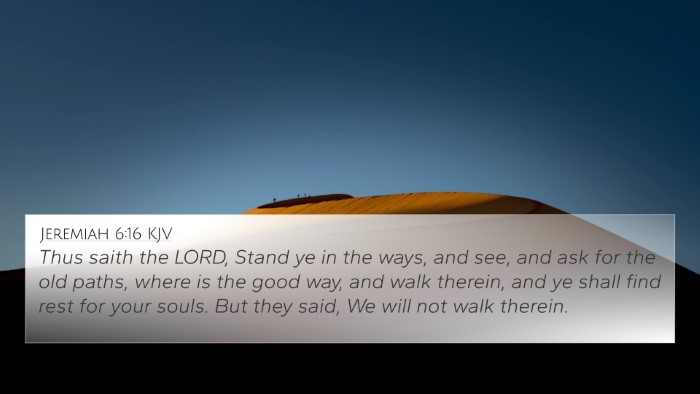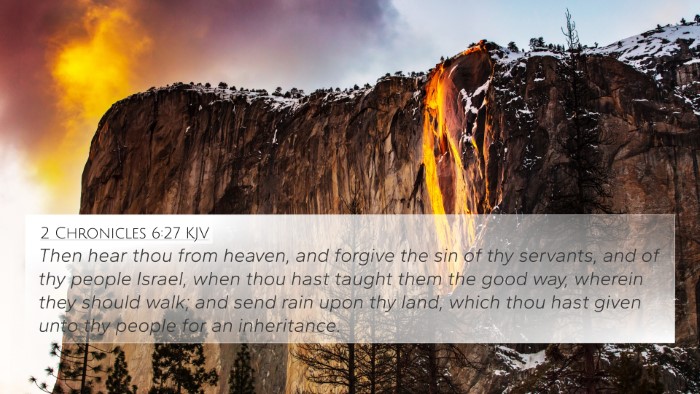Understanding 1 Samuel 12:23
1 Samuel 12:23 states, "Moreover, as for me, God forbid that I should sin against the Lord in ceasing to pray for you: but I will teach you the good and the right way." This verse encapsulates a profound commitment to prayer and guidance, reflecting the responsibilities of leaders in spiritual care.
Summary of Key Themes
- Intercessory Prayer: The importance of praying for others is highlighted, demonstrating a leader's duty to intercede.
- Moral Responsibility: The verse underscores the idea that failing to pray for others is a sin against God.
- Teaching Righteousness: It expresses a commitment to guiding others towards righteousness and goodness.
Commentary Insights
Matthew Henry: He emphasizes the moral obligation Samuel feels towards the people. Henry notes that prayer is not merely a personal benefit but a communal responsibility. Samuel's intent to teach signifies that leadership involves not just governance but also spiritual education.
Albert Barnes: Barnes comments on the gravity of ceasing to pray, indicating that a lack of prayer could lead to divine judgment. He points out that Samuel’s statement reflects both humility and recognition of his role as a mediator between God and the people.
Adam Clarke: Clarke highlights the contrast between the spiritual responsibilities of leaders versus the negligence of the people. He explains that Samuel's dedication to prayer exemplifies the ultimate duty of a prophet, emphasizing the need for consistent intercession on behalf of the community.
Bible Verse Cross-References
This scripture can be connected to various other verses that underline similar themes of intercession, moral leadership, and commitment to teaching:
- 1 Thessalonians 5:17: "Pray without ceasing."
- James 5:16: "The prayer of a righteous person is powerful and effective."
- Luke 22:32: "But I have prayed for you, Simon, that your faith may not fail."
- Ephesians 6:18: "And pray in the Spirit on all occasions with all kinds of prayers and requests."
- Romans 1:9: "God, whom I serve in my spirit in preaching the gospel of his Son, is my witness how constantly I remember you in my prayers at all times."
- Colossians 1:9: "We have not stopped praying for you..."
- 2 Corinthians 1:11: "...as you help us by your prayers."
Thematic Connections
This verse and its context reveal several themes essential for understanding leadership in Biblical terms:
- Prayer as a Leadership Tool: Samuel's prayer signifies reliance on God's strength in leading the people.
- Righteousness as a Guiding Principle: Leaders are urged to uphold moral integrity as they lead others.
- Community Responsibility: There is a shared responsibility among leaders and followers in seeking God's will.
Cross-Referencing Biblical Texts
Utilizing cross-references enhances understanding and reveals deeper insights into Biblical teachings. It creates a rich tapestry of meaning, connecting different scriptures that relate to prayer, leadership, and righteousness.
Tools for Bible Cross-Referencing
To aid in further study, utilizing tools like a Bible Concordance or a Bible Cross-Reference Guide can be beneficial for exploring these connections:
- Bible concordance: Helps locate specific words and their occurrences throughout scriptures.
- Bible cross-reference guide: Offers insights into related verses for deeper understanding.
- Bible chain references: Facilitates thematic studies across different texts.
Conclusion
1 Samuel 12:23 is a powerful reminder of the responsibilities borne by spiritual leaders. Through earnest prayer and dedication to teaching righteousness, leaders can fulfill their God-given roles. This verse connects profoundly with the broader themes present in the Bible, facilitating a deeper understanding of God’s expectations for both individual believers and the community as a whole.















